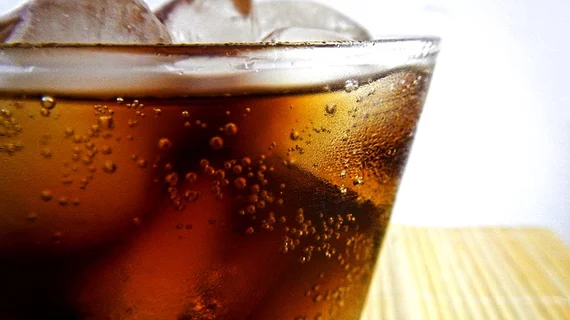Heart issues more common in adults who drink soda, other sweetened beverages
Adults who regularly drink sweetened beverages face a heightened risk of atrial fibrillation (AFib), according to new data published in Circulation: Arrhythmia and Electrophysiology.[1]
The study’s authors reviewed data from more than 200,000 adults who enrolled in the U.K. Biobank study from 2006 to 2010. All participants were free of AFib at the start of the analysis. The mean follow-up period was 9.9 years.
Overall, drinking at least two liters of artificially sweetened beverages such as diet soda per week was associated with a 20% higher risk of AFib. Drinking at least two liters of sugar-sweetened beverages, meanwhile, was linked to a 10% higher risk.
The group emphasized that this study does not directly prove that sugar- and artificially sweetened drinks change a person’s risk of developing AFib. Instead, the group highlights the fact that people who regularly consume those drinks are more likely to develop AFib than people who do not.
“Our study's findings cannot definitively conclude that one beverage poses more health risk than another due to the complexity of our diets and because some people may drink more than one type of beverage,” lead author Ningjian Wang, MD, PhD, a researcher at the Shanghai Ninth People's Hospital and Shanghai Jiao Tong University School of Medicine in Shanghai, China, said in a prepared statement. “However, based on these findings, we recommend that people reduce or even avoid artificially sweetened and sugar-sweetened beverages whenever possible. Do not take it for granted that drinking low-sugar and low-calorie artificially sweetened beverages is healthy, it may pose potential health risks.”
Other key takeaways from the group’s analysis of U.K. Biobank data:
- Drinking up to one liter of pure juice per week—unsweetened orange juice or vegetable juice, for example—was associated with an 8% lower risk of AFib.
- Study participants who are male, young and have higher BMIs were more likely to consume a high amount of sweetened beverages each week.
- Smoking cigarettes was also linked to an increased likelihood of developing AFib.
“Although the mechanisms linking sweetened beverages and atrial fibrillation risk are still unclear, there are several possible explanations, including insulin resistance and the body’s response to different sweeteners,” Wang added in the same statement. “Artificial sweeteners in food and beverages mainly include sucralose, aspartame, saccharin and acesulfame.”
Click here to read the full analysis in Circulation: Arrhythmia and Electrophysiology, a journal from the American Heart Association.

